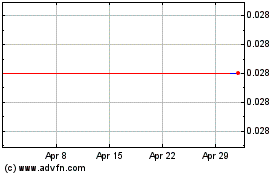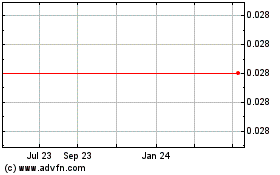UPDATE: Junior Iron Ore Miners Move To Flexible Pricing
August 04 2009 - 7:30AM
Dow Jones News
Junior iron ore miners watching the weakening of the annual iron
ore benchmark pricing system from the sidelines are increasingly
moving toward forging their own supply contracts that allow more
flexibility.
Australian iron ore producer Atlas Iron Ltd. (AGO.AU) said
Tuesday it uses a system that still takes as a base the benchmark
settled annually between the three iron ore majors and Asian and
European steel mills, but has "mutual fairness" clauses that take
into account spot market price swings during the year.
The Perth-based miner has sold output from its Pardoo mine to
three years from now using the price swing clauses, and may also
use the system for sales from the Wodgina project in Western
Australia.
Atlas Iron Managing Director David Flanagan said the company has
started iron ore offtake talks with potential customers from China,
Taiwan, Japan and Thailand for the Wodgina project.
Pardoo is scheduled to produce 1 million metric tons of iron ore
in 2009, and 2.5 million tons in 2010.
Gindalbie Metals Ltd. (GBG.AU), which is developing the A$1.8
billion Karara iron ore project with China's Anshan Iron &
Steel Group Corp., is still planning to sell its ore based on the
benchmark system, but is open to an individual price agreement with
Ansteel.
"Ansteel is keen on the benchmark. There used to be an Asian
benchmark, but it could be that we now have a China and a non-China
benchmark," Gindalbie Chief Executive Garret Dixon told reporters
at the Diggers and Dealers forum in Western Australia.
"Iron ore is difficult to be traded on an exchange. But if there
really is no benchmark, we could negotiate with Ansteel at the
time," said Dixon.
The long-standing annual benchmark system is losing its place as
the predominant pricing system, with producers and consumers
increasingly moving to a more flexible system that allows for
changes in prices during the year.
That is particularly so since the dominant three iron ore miners
Rio Tinto PLC (RTP), BHP Billiton Ltd. (BHP) and Vale S.A. (VALE)
still haven't clinched a deal with Chinese mills for the current
iron ore pricing year that began April 1.
Other mills in Asia have fallen in line with Rio Tinto's
benchmark deal that cut iron ore prices by 33%-44%.
The majority of seaborne iron ore trade is still priced using
the benchmark system, but BHP Billiton's recent announcement it has
sold about 30% of product on a mix of spot, quarterly and
index-linked basis has added weight to analysts' predictions that
benchmark pricing may soon be redundant.
"We would like to see less tension during iron ore talks,"
Flanagan said. "We currently have no benchmark, so we're selling on
spot."
Atlas Iron plans to boost annual output to 6 million tons a year
by 2012, up from 1 million tons in 2009.
-By Elisabeth Behrmann, Dow Jones Newswires; 612-8272-4689,
elisabeth.behrmann@dowjones.com
Gindalbie Metals (ASX:GBG)
Historical Stock Chart
From Mar 2024 to Apr 2024

Gindalbie Metals (ASX:GBG)
Historical Stock Chart
From Apr 2023 to Apr 2024
